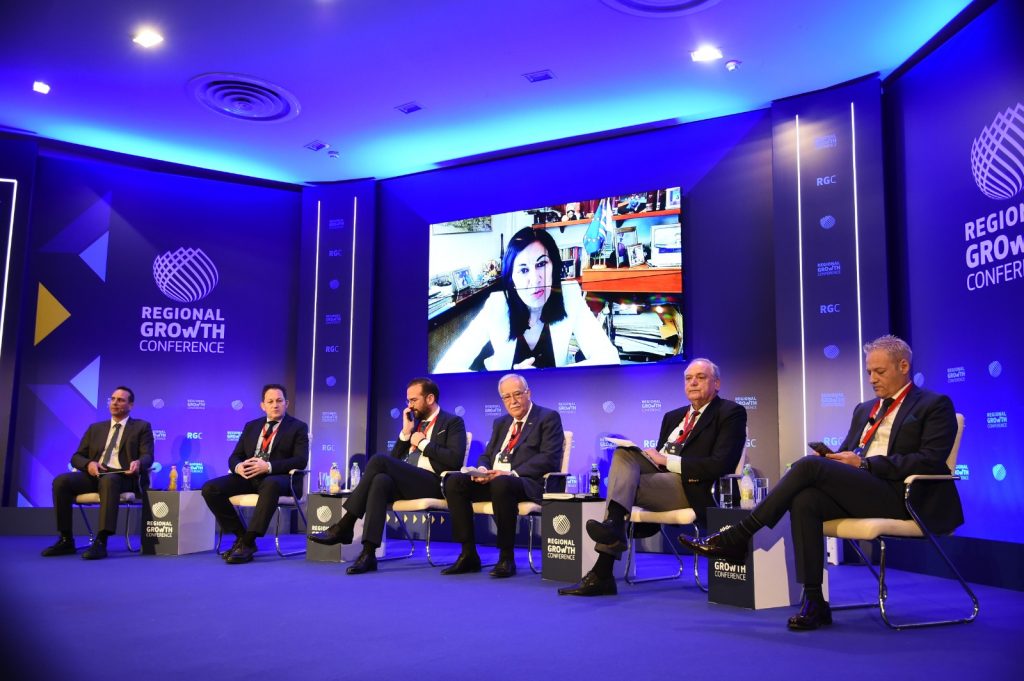
We bring you here below the entire speech by Olympia Anastasopoulou, Secretary General for Tourism Policy and Development delivered at the 11th RDG which took place in Patras, Peloponnese 16,17 and 18 March:
Ladies and gentlemen,
I am very pleased to participate in the 11th Regional Development Conference.
As policymakers, we see tourism as a strategic sector that can not only attract foreign investment in the long term and boost employment, but above all promote the country’s regional development.
That is why this sector is at the heart of sustainability, innovation, but also extroversion.
It is no coincidence that the main objectives of the national tourism policy have been set the extension of the tourist season, the improvement of the competitiveness, quality, authenticity and resilience of the tourism product and at the same time the strengthening of tourism investments with a low environmental footprint.
Our strategy for the Greek tourism ecosystem is directly related to the quality of living standards, the preservation of natural beauty, as well as the economic evolution of the local societies in Greece.
Dear friends,
In most municipalities and regions of the country, the desire to develop tourism starts from the need to boost their economy, because tourism creates jobs, brings monetary gains, contributes to the preservation of cultural heritage, the protection of the local natural and man-made environment, the improvement of living standards and the expansion of social welfare.
In fact, the effects of tourism are many and are related to the economic identity of a destination, which has an impact on employment, the balance of payments, foreign exchange, the environment and social structure. The expenditure of tourists – their expenses – contributes directly to increasing the efficiency of local economic activities and generates tax revenues for the local community and the public sector.
In fact, research by Grant Thornton and the Hellenic Chamber of Hotels shows that the benefits of tourism are diffused in 17 sectors of economic activity and 9 sectors of the Greek economy, including the primary one.
These 9 sectors of activity directly linked to the hospitality industry (out of a total of 20 in the economy) are industry and manufacturing, wholesale and retail trade, transport and storage, construction, electricity, gas, steam and air conditioning, water supply and waste management, information and communication, scientific, technical, administrative and support activities.
At the same time, Grant Thornton’s survey on investments in hospitality (total accommodation and catering units) records an average annual contribution to the country’s economy of €1.5 billion. euro. The amount of annual investments in renovations reaches 1 billion, while the creation of new accommodation reaches 170 million. In addition, other investments in accommodation amount to EUR 300 million. annually and to EUR 140 million. the investment funds in the catering establishments.
As Grant Thornton adds, hospitality is the first sector in terms of job supply (1 in 4 jobs in the country).
Also, I would like to highlight among the 9 sectors of the Greek economy that receive significant benefits from tourism is the primary sector, according to a survey by the Institute of Tourism Research and Forecasting (FORTH) on behalf of the Hellenic Chamber of Hotels. As shown by the survey, 88% of hotels’ expenditure on food and beverages concerns the purchase of Greek products. This percentage is allocated by 36% to local producers (i.e. within the prefecture where it operates). each hotel) and 52% in the rest of Greece. Expenditure on purchases of locally produced products recorded its highest percentages in Crete (47%), the Peloponnese (46%) and the North Aegean (44%).
The supply of eggs, honey, oil, olives, jams and grocery products to hotels is almost exclusively a Greek affair, as they are produced either locally or throughout the country. The meat supply is 78% Greek. The corresponding percentage in fish and seafood is 72%. But also 97% of the wines consumed by hotels are Greek.
In short, these are resources for the economy, they are resources for businesses, they are resources for the local community itself. Tourism does not only feed the public coffers through taxation. It enhances, as you can imagine, a very wide range of activities: from large hotel units and airlines to many smaller accommodation rental businesses.
And at the same time it is he who mobilizes local markets at all levels. From the Primary Sector – as I mentioned earlier – to construction, from transport to catering.
So tourism is a spark of growth for many and for many. And it is no coincidence, therefore, that this sector contributes significantly both to the growth of our national product and to the crucial area of employment, as well as to investment. Many of the investment projects that are being launched in total, today, in the country and especially in the Region concern the tourism industry. It should be noted that 8 out of 10 investments in the country concern tourism.
Therefore, tourism is also turning into a field of activation of public, European and private capital, in which, if bank loans are also calculated, they will only exceed 1 billion for 2022, as the Prime Minister, Kyriakos Mitsotakis, mentioned in his speech at the event of the Ministry of Tourism on the subject: “2022 – The great return of Greek tourism” on 20/12/2022.

Dear Ladies and Gentlemen,
Since several important domestic destinations face a plethora of complex development challenges with economic, social and environmental impacts, which require the cooperation of local authorities with central government, so that effective and interlinked actions can be planned and implemented, it is necessary for all stakeholders to combine tourism with “non-directly tourist” activities and achieve the their harmonious coexistence in a competitive environment, which is bounded by developmental and non-developmental activities.
Therefore, the Local Government as one of the important stakeholders is called upon to contribute to the maximization of the benefits of tourism activity, both of business units and of public tourism special infrastructure.
At the same time, it should be borne in mind that the contribution of certain destinations to national tourism is so important that the initiative to address their development issues can no longer be the sole responsibility of local administrations.
Furthermore, the administrative structures of the local and regional development organizations that have been established, do not provide the required capacity for flexibility and quick response to the needs of the destination, while failing to respond to the modern trends, innovations and challenges of the international tourism market. As a result, the development process of destinations often includes only promotional and communication actions and not substantial and integrated strategies and interventions, resistant to any political discontinuity and highly adaptable to changing circumstances.
Hence, in order to ensure the sustainability of the destination and maximize the benefits of both residents and visitors of the destination, integrated planning and commitment of all stakeholders is essential, and this is exactly the point where all together, private sector, central government and local government, can make a difference.
In this effort, valuable tools are the European funding and specifically the Executive Structure of the NSRF Tourism sector (GRNETT) as well as the Recovery and Resilience Fund (RRF) in critical projects for tourism development.
Specifically, the actions for local government that have been included in the National Resilience and Recovery Plan (NRRP), concern primarily the “Destination Management” and secondarily all the other actions of the Fund where the Local Government can participate in the following projects:
1. Upgrading of tourist ports
2. Mountain Tourism
3. Health and Wellness Tourism
4. Agrotourism and Gastronomy
5. Accessible beaches
6. Diving tourism
Destination Management and Promotion Organizations (DMMOs) are more directly relevant to local government. The examined project concerns the funding of studies and preparation for the establishment of pilot Destination Management and Marketing Organizations (DMMOs) and the creation of local Observatories of Sustainable Tourism Development (in each pilot DMMO).
More specifically, the Project “Destination Management” is in full alignment with the principles of Green Development, concerns the improvement of destination management through the establishment and operation of local / regional Destination Management and Promotion Organizations and Observatories of Sustainable Tourism Development.
The physical scope of the project concerns:
A) The funding of the necessary studies for the establishment and operation of pilot Destination Management and Marketing Organizations (DMMOs), for the efficient and effective governance of the individual destinations of the country, the facilitation of cooperation between the various authorities and co-competent bodies at local and regional level, and the formation of a qualitative, diversified, a competitive, modern and sustainable tourism product, and
B) The financing of the establishment and operation of a Sustainable Tourism Development Observatory in each DMMO pilot, in order to make available the necessary data and data that will form the basis for the integrated planning of tourism strategies, through the provision of the required information and monitoring of the course of tourism sizes.
Indicatively, the funding includes:
• Cooperation with data providers
• Pilot implementation of the Observatory
• Creation of a Digital Platform (technical support, analysis of requirements and design of solutions, installation and adaptation, mapping, integration and interoperability, etc.).
Ladies and gentlemen,
DMMOs will have three pillars of activity that will be related to (a) development, (b) management and (c) the promotion of a destination, while highlighting the levels and degree of cooperation of all tourism actors. The advantage of these structures is that they will be able as entities to bring together stakeholders from different sectors, while their success lies in highlighting the concept of cooperation. Their aim will be to operate at an integrated level and not just be a forum, but a body that will essentially be a vehicle for decision-making and the formation of a common line, so that individual parties can negotiate collectively with external actors for the benefit of their destination.
In addition, DMMOs, as has been the case abroad for years, eliminate bureaucracy and streamline tourism development. Two fields that concern us particularly in the Ministry of Tourism as the integration of the principles and practices of sustainability, which is not only environmental, but also economic and social, is a matter of creating a competitive advantage and developing tourism in our country and therefore is a national priority.
As the main objectives of the national tourism policy we have also set the extension of the tourist season, the improvement of the competitiveness, quality, authenticity and resilience of the tourism product and at the same time the strengthening of tourism investments with a low environmental footprint.
In other words, the adoption of the Sustainable Development Goals (SDGs) is crucial for the recovery leading to greener, more inclusive economies and stronger, more resilient societies.
Having said that, the legislative initiative of the Ministry of Tourism for the creation of Destination Management Bodies (DMOs) that will be significantly enhanced by resources of the Recovery Fund, and that ensure tourism development in terms of sustainability, the protection of the natural environment of the destination, the promotion and management of local quality labels, the possibility of establishing observatories of sustainable tourism development, is important. with the aim of preserving the natural and cultural wealth of our country.
All the above are part of our holistic plan for the substantial upgrade of our tourism product, with the ultimate goal of making it a competitive advantage of our country internationally.
Dear friends,
The resources and policies are there. With synergies and partnerships we have the opportunity to shape the agenda for the real transformation of tourism and the transition to the next day for the entire Region.
Thank you!





